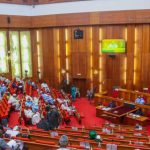50-year-old bricklayer Lukman Adeyemi describes his horrific 24-year incarceration experience, which was brought on by an erroneous act of loyalty to a friend.
His narrative, as documented by Vanguard, sheds light on the injustices and systemic shortcomings that caused his unlawful and protracted detention.
Adeyemi characterizes his first experience with the legal system as a plunge into despair. He was held in pretrial custody for nine years before being sentenced to an agonizing fifteen years on death row. He was subjected to unbearably painful circumstances that resembled a never-ending nightmare.
Adeyemi was subjected to intense physical and psychological torture while being questioned by SARS Police agents, which resulted in forced confessions for crimes he was unaware of.
Adeyemi reflects on his unfair situation and starts to doubt the honesty and impartiality of the system. Even though he was an innocent spectator, he was mired in an apparently unsolvable legal maze. Out of loyalty, he decided to go to the police station with his buddy Ismaila Lasisi, which resulted in his unjust detention and subsequent incarceration.
Adeyemi encountered skepticism and distrust as he tried to tell his story during his incarceration. His suffering increased due to the general atmosphere of mistrust and suspicion as he battled unjust allegations and a lack of justice.
But when he came upon Pastor Hezekiah Olujobi’s Center for Justice, Mercy, and Reconciliation, hope began to bloom. Their encouragement and support suggested a possible turning point in his fight for liberation.
Sharing his story, Adeyemi said, “I am Lukman Adeyemi, a native of Iwere-Ile, Iwajowa Local Government, Oyo State. I am a bricklayer by profession. I was 26 years old when I had this problem. In August 2000, after returning home from work with a friend living with me, Ismaila Lasisi, we were told that the police came looking for Ismaila and he was asked to report to the station.
“I immediately decided to follow him to the station. Lo and behold, I was arrested and detained along with him. I was tortured to the point of death over a crime I knew nothing about, right from the police station. I had a close shave with death over the murder of a woman hired by some of Ismaila’s ex-friends to fetch water for them at a construction site. The woman left home in the morning and never returned.
“Ismaila once lived with them. He begged to live with me after a misunderstanding with these people in March. I knew these people from a distance. Our paths never crossed. This was how I was charged to court along with these people over an offence I knew nothing about. In 2009, we were sentenced to death. We filed separate appeals, but they failed up to the Supreme Court.
“My story of innocence to whoever cared to listen fell on deaf ears, with many questioning, ‘If you’re not one of them, why mention your name?’ and ‘If truly you are innocent, why can’t the court free you?’
“I felt abandoned by the truth itself. I spent 24 years behind bars like 24 hours, a sleepless night that lasted for two decades.
“In June 2023, one of the officers of the Correctional Service, Deputy Superintendent of Correctional (DSC) AbdulKareem Awesu, introduced my case to a pastor, and I spoke with him on the phone.”
The Justice, Mercy, and Reconciliation Center intervenes.The Centre for Justice, Mercy, and Reconciliation (CJMR), headed by Pastor Hezekiah Olujobi, paid us a visit on July 17, 2023, in the Ibara Correctional Facility. They heard us all out, even the guilty ones who cleared us. The group examined our verdict and revealed our innocence. In my life, June 14, 2024, will always be a special and unforgettable day. I saw the moon for the first time, and light shone upon me together with the first drops of rain falling on my head.
“I never knew I could pay for the sin of another man. How could I have committed an offence and still boldly walk into a police station to report myself?
“I am grateful that the Centre for Justice Mercy and Reconciliation intervened on my behalf, a beacon of hope in a sea of despair. Their belief in my innocence reignited the flame of justice within me, propelling me toward the possibility of redemption.”
“Our attention was drawn to the complaints of these two individuals by Welfare Officer DCP Awesu, who assured us of their innocence and the efforts made through the legal process without justice,” Pastor Hezekiah Olujobi, the Executive Director of CJMR, said in an elaboration on their efforts.
“We visited the Ibara Custodial Centre in Abeokuta to hear from them. The true perpetrators confessed that they committed the crime and that Adeyemi and Lasisi were innocent. We reviewed their judgments from both the trial court and the Supreme Court and found that the state’s presentation before the appellate court never allowed the court to shift ground.
“Lukman Adeyemi and his friend filed separate appeals to the Court of Appeal and the Supreme Court. None of the lawyers explored the way of arresting each person involved in this case. The course of probing the arrest process unfolded the truth.
“In the record of proceedings, we stumbled on evidence from PW1, a police officer who detailed the arrest. The contradictions in the judgments, the confessions of the real perpetrators, and the corroboration of their innocence led us to forward our findings to the office of the Attorney-General of Ogun State and the Committee for the Board of Prerogative of Mercy, who considered our appeal.”
Pastor Olujobi identified a number of problems that contribute to erroneous convictions in Nigeria, including incompetent legal representation, false police reports, and tenacious prosecution. He made it clear that not all police evidence is correct or trustworthy, even if it is usually regarded with great respect.
Because judges are human, mistakes made by subordinate courts can be corrected through the appeals process. After all legal options have been explored and justice is still elusive, CJMR examines court records and submits cases to the Board of Mercy for reconsideration.
In the South West Nigeria Custodial Service, CJMR has been successful in securing the freedom of over 600 people who were unfairly detained and in facilitating the release of over 20 wrongfully convicted prisoners. More than 300 people have been successfully reintegrated into society. Twelve death row inmates and ten cases that are awaiting trial are being reviewed at this time for intervention. In order to assure the court appearance of those who are awaiting trial, CJMR works with pro bono attorneys to represent them in a number of high courts located in the states of Ogun, Oyo, and Osun.
CJMR defends the rights of individuals in prolonged imprisonment without legal counsel from the Director of Public Prosecutions by requesting case file updates from the Ministry of Justice. They refer the issue to the Chief Judge’s office for resolution if no case file can be located.
These activities have been made possible by the support of the Ogun State Ministry of Justice, Honorable Justice Munktar Abimbola (Rtd), the Ogun State Chief Judge, Honorable Justice Mosunmola Dipeolu FICMC, FHNR, and the former Chief Judge of Oyo State.
The Nigeria Correctional Service, Ogun State, the Committee for the Board of Mercy, and Governor Dapo Abiodun worked together to establish Lukman Adeyemi and Ismaila Lasisi’s innocence. After the genuine offenders admitted their guilt, they were freed.
Adeyemi and Lasisi acknowledge the difficulties they had and the lives they lost while being wrongfully imprisoned and thank everyone who helped bring them to freedom in the end.
Lukman Adeyemi and Ismaila Lasisi are receiving rehabilitation and reintegration support at the CJMR Halfway Home at this time.




